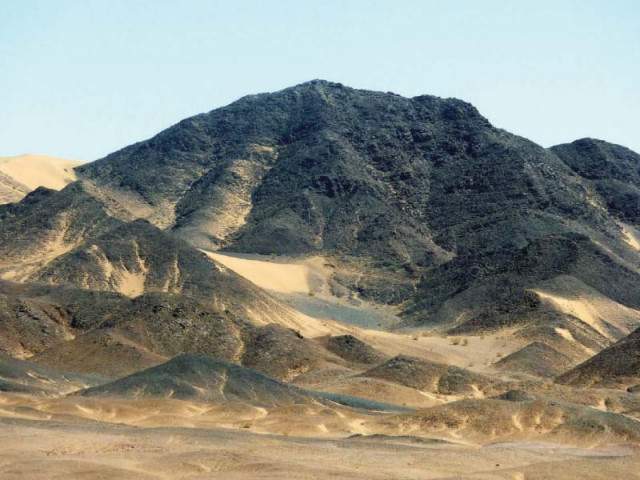To avoid damages, govt must go for settlement with TCC
International court has slapped $5.9b penalty on Pakistan in Reko Diq case

The government should abandon the policy of litigation and frame a policy that can attract top companies of the world for capital injection into copper and gold mining projects. PHOTO: FILE
It was the time when TCC got a certification of proven copper and gold reserves at the project site from a credible laboratory and the company was poised to kick off commercial mining.
Following the finding that the Reko Diq project area, located in Chagai district of Balochistan, had vast deposits of copper and gold, several players entered the fray to get a slice of the pie, which stirred a controversy.
The Reko Diq area sits on a long belt that comes from Turkey and Iran and then enters Pakistan. TCC had got a licence for exploring copper and gold over some area of that belt.
In a feasibility report submitted to the Balochistan government, TCC projected that the Reko Diq project would have a turnover of over $60 billion over a period of 56 years.
The projection was based on a price of $2.2 per pound of copper and $925 per ounce of gold in the year 2009. The price could vary with the rate of gold, which has now jumped to $1,280.2 per ounce in the international market. The mine has estimated reserves of 11.65 million tons of copper and 21.18 million ounces of gold.
Reko Diq had also attracted Metallurgical Corporation of China (MCC), which was also working on the Saindak gold and copper mining project in Balochistan. The Chinese company entered the race to get the Reko Diq contract.
Then Pakistan ambassador to Chile Burhanul Islam sent a letter to then petroleum minister Naveed Qamar in September 2009, asking the government of Pakistan Peoples Party (PPP) should not involve MCC in the project. He suggested to the government to award another mining site to the Chinese company if it was interested in another gold mining project.
However, the controversy deepened and finally the case landed in the international court of arbitration. TCC has now won the case and the World Bank’s International Centre for Settlement of Investment Disputes (ICSID) has slapped a penalty of $5.9 billion on Pakistan.
Lack of agreement
There were some differences between Pakistan and TCC which sparked the dispute. First, Balochistan government demanded 25% share in the project without investing anything. TCC agreed to give 25% shareholding to Balochistan government, though Balochistan Mineral Rules offered 100% ownership to the companies that got a mining licence.
However, TCC demanded that Balochistan government invest 25% in project mining but the province refused to accept the condition.
In 2010, TCC Pakistan Chief Executive Officer Gerhard Von Borries held a press conference and offered to appoint an international auditor for evaluating the presence of copper and gold mines and their financial value under the Reko Diq project.
He was of the view that Balochistan Mineral Rules offered 100% ownership to the companies that got mining licence but despite that the company offered 25% stake to Balochistan government.
Apart from this, the Pakistan side asked TCC to set up a processing facility for gold to be explored from Reko Diq. However, the TCC management found it surprising that Chinese company MCC was exploring gold in Saindak copper and gold project but it did not have a refinery in Pakistan.
Moreover, TCC argued that the setting up of a refinery for only the Reko Diq project was not economically feasible. However, it said it was ready to establish the refinery at a later stage after the project became economically viable.
Sabotage
International and domestic players played a key role in sabotaging the vital project. TCC was a joint venture of renowned companies. At that time, the company was of the view that 54% earnings would go to the national kitty.
It argued that the company had not violated Balochistan Mineral Rules and was also ready to evaluate model mining agreements currently prevalent around the world. It also expressed willingness to re-negotiate the deal. But past governments did not care much. During the PPP-led government from 2008-13, then petroleum minister Dr Asim Hussain tried to reach an out-of-court settlement to avoid the payment of damages by Pakistan.
Then federal government also approached the Balochistan government, suggesting an out-of-court settlement. The province was also warned that the federal government would not bear any responsibility if damages were imposed by the international court.
Apart from the Reko Diq case, Pakistan has lost another case pertaining to the Karkey rental power plant. Assets of Pakistan were at risk around the world as Pakistan government was asked to deposit $150 million for getting a stay order against enforcement of the court’s decision.
Settlement
Pakistan government has already been in touch with the Canadian government to settle the Reko Diq matter. At present, Pakistan is facing a financial strain and has got support packages from friendly countries. It has also opted for a $6-billion bailout from the International Monetary Fund (IMF).
In this situation, Pakistan cannot afford to pay damages. The better option is to go for a settlement with TCC, which is also willing to negotiate, to avoid paying damages.
Pakistan has a 15km belt of gold and copper deposits and with the help of these it can turn around the economy. The government should abandon the policy of litigation and frame a policy that can attract top companies of the world for capital injection into copper and gold mining projects.
Published in The Express Tribune, July 17th, 2019.
Like Business on Facebook, follow @TribuneBiz on Twitter to stay informed and join in the conversation.



















COMMENTS
Comments are moderated and generally will be posted if they are on-topic and not abusive.
For more information, please see our Comments FAQ